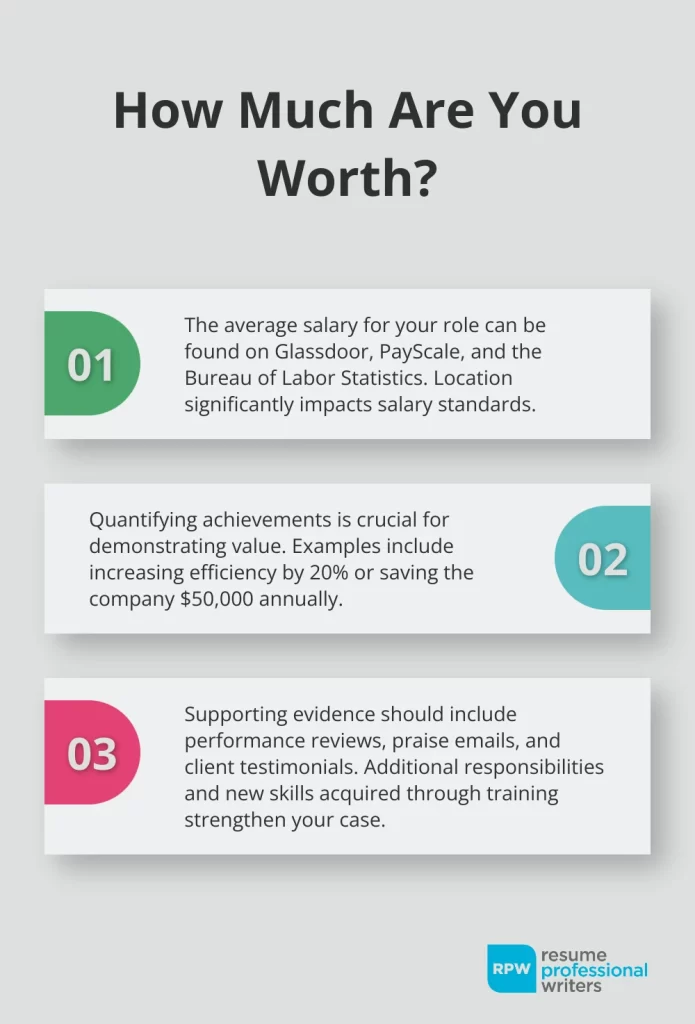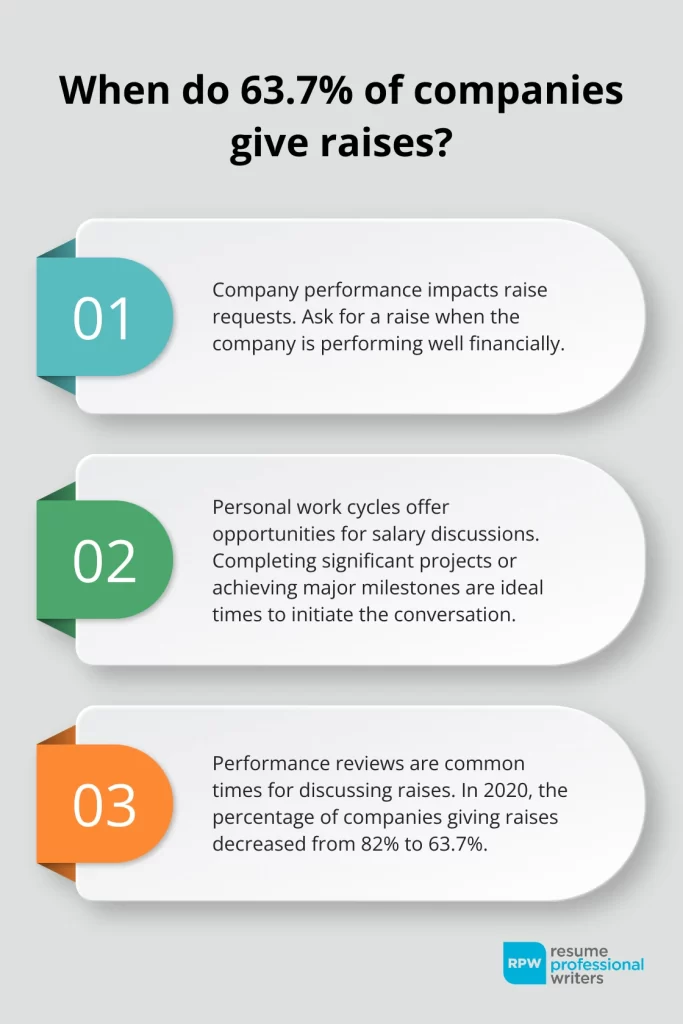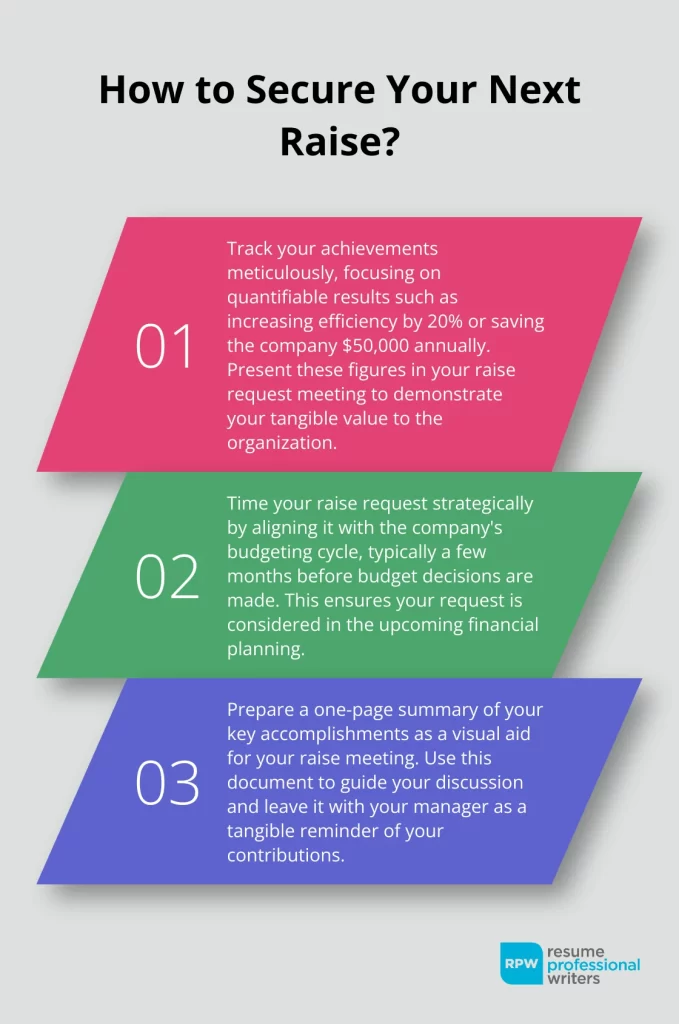Asking for a raise can be daunting, but it’s a crucial skill for career growth. At Resume Professional Writers, we understand the importance of advocating for your worth in the workplace.
This guide will walk you through the essential steps on how to ask for a raise effectively, from preparation to execution. We’ll provide practical tips to help you confidently approach this conversation with your employer and increase your chances of success.
How to Ask for a Raise: Building Your Case
At Resume Professional Writers, we understand the importance of preparing a strong argument for your salary increase. This chapter will guide you through the essential steps to build a compelling case for your raise.
1. Research Industry Salary Standards
Start your preparation by investigating salary standards in your industry. Websites like Glassdoor, PayScale, and the Bureau of Labor Statistics provide valuable insights into average salaries for your role and experience level. Factor in your location, as salaries can vary significantly by region. This research will establish a solid foundation for your request and help you set realistic expectations.
2. Document Your Achievements
Compile a comprehensive list of your accomplishments since your last raise or since joining the company. Focus on projects where you exceeded expectations, solved critical problems, or contributed to the company’s bottom line. For example:
- Sales professionals: Highlight closed deals and their value
- Marketing experts: Showcase campaigns and their impact on brand awareness or lead generation
- IT specialists: Detail implemented systems that improved efficiency or security
3. Quantify Your Value
Numbers speak volumes when demonstrating your worth. Translate your achievements into tangible metrics whenever possible. Consider these examples:
- “Increased efficiency by 20%”
- “Saved the company $50,000 in annual costs”
- “Boosted customer satisfaction scores by 15 points”

These concrete figures make a powerful statement about your value to the organization.
4. Gather Supporting Evidence
Collect positive feedback from colleagues, clients, and supervisors to strengthen your case. Include:
- Performance reviews
- Emails praising your work
- Client testimonials
Also, highlight any additional responsibilities you’ve taken on or new skills you’ve acquired through training or certifications. This comprehensive portfolio will illustrate your growth and value to the company.
5. Prepare Your Pitch
With your research and evidence in hand, craft a concise and compelling pitch. Outline your key achievements, the value you’ve brought to the company, and your future goals. Practice your delivery to ensure you come across as confident and professional. Consider preparing an elevator pitch to succinctly convey your value proposition.
🔍 Think Your Resume’s Fine? Let’s Double-Check That
Even strong resumes can miss critical details—especially when it comes to passing Applicant Tracking Systems (ATS). Our specialists offer a free review to uncover gaps, improve formatting, and ensure your resume is ATS-ready and recruiter-friendly.
As you complete these steps, you’ll be well-equipped to make a strong case for your raise. The next chapter will guide you through the crucial aspect of timing your request for maximum impact.
When to Ask for a Raise
Consider Company Performance
The financial health of your company plays a key role in the success of your request. You should ask for a raise when the company performs well. Monitor quarterly reports, recent successes, or positive news about the company’s growth. If your organization just landed a major client or reported strong earnings, it might present an opportune time to discuss your compensation.
Capitalize on Your Work Cycle
Your personal work cycle can provide excellent opportunities to initiate a salary discussion. The completion of a significant project or achievement of a major milestone often presents an ideal time. Your contributions remain fresh in your manager’s mind, making it easier to justify your request. For example, if you’ve just led a team to launch a new product or streamlined a critical process, use this momentum to your advantage.
Sync with Performance Reviews
Many companies conduct annual or bi-annual performance reviews. These periods often serve as designated times for discussing your role, achievements, and future within the company. In 2020, the number of companies giving raises decreased from 82 percent to just 63.7 percent, according to Payscale’s 2021 Report. If your company follows this practice, prepare your case well in advance of these scheduled meetings.
Time Your Request Strategically
Timing involves more than choosing the right day. It also requires you to build a solid track record. Typically, you should hold your position for at least a year before asking for a raise (unless you’ve taken on significant new responsibilities or your role has expanded considerably).

Try to avoid high-stress periods for management, such as during major deadlines or company-wide initiatives. Your request might get overshadowed by other priorities, reducing its impact. Instead, select relatively calm periods when your manager can give your request the attention it deserves.
Align with Budgeting Cycles
If you know your company’s budgeting cycle, time your request accordingly. Many organizations set budgets annually or quarterly. Approach your manager a few months before these decisions to ensure consideration of your raise in the upcoming budget.
These factors will position you to choose the most opportune moment for your salary discussion. With your case prepared and your timing strategically planned, you can now focus on executing the conversation effectively. The next chapter will guide you through the process of conducting a successful salary negotiation meeting.
How to Nail Your Raise Request Meeting
Setting the Stage
Schedule a dedicated meeting with your manager, preferably in person or via video call. Choose a time when both of you will likely focus and avoid distractions. Send a brief agenda that outlines the purpose of the meeting to set clear expectations.

On the day of the meeting, dress professionally to reinforce the seriousness of the conversation. Arrive early (whether to a physical meeting room or a virtual call) to ensure you’re composed and prepared.
Making Your Case
Start the meeting by thanking your manager for their time and briefly state your purpose. Then, present your well-prepared pitch. Confidently showcase your achievements, using specific examples and data you’ve gathered.
For instance, instead of saying “I improved our customer service,” say “I increased our customer satisfaction scores by 15% over the past six months, which resulted in a 20% increase in repeat business.”
Use visual aids if appropriate. A single-page summary of your key accomplishments can serve as a powerful tool, leaving your manager with a tangible reminder of your value.
Navigating the Conversation
Prepare for questions and potential pushback. Your manager might ask about your long-term goals or how you plan to contribute further. Have clear, concise answers ready that align your ambitions with the company’s objectives.
If your initial request meets hesitation, prepare to negotiate. Consider having a fallback position, such as a smaller raise combined with additional benefits or a promise to revisit the conversation in a few months.
Looking Forward
End the meeting by discussing your future goals and how they align with the company’s vision. This demonstrates your commitment and gives your manager insight into your long-term value.
If a raise isn’t possible immediately, ask about specific performance targets that would warrant a salary increase. This sets the stage for future discussions and shows your proactive approach to your career development.
Follow-Up Actions
After the meeting, send a thank-you email summarizing the key points discussed and any agreed-upon next steps. This creates a paper trail (and reinforces your professionalism). It also serves as a gentle reminder of your request and the value you bring to the organization.
Final Thoughts
Asking for a raise requires thorough preparation and strategic timing. You must research industry standards, document your achievements, and quantify your value to the company. The right moment to request a salary increase depends on your company’s financial health, performance review periods, and your recent successes.

Present your case confidently and professionally during the meeting. Use specific examples and data to illustrate your contributions. Maintain open communication with your manager about your career aspirations and continue to demonstrate your value consistently.
We at Resume Professional Writers understand the importance of effective self-presentation in salary negotiations. Our expert resume writing services can help you highlight your achievements (giving you the confidence to advocate for yourself). Master the art of how to ask for a raise and take a proactive step in shaping your career path.









